Share
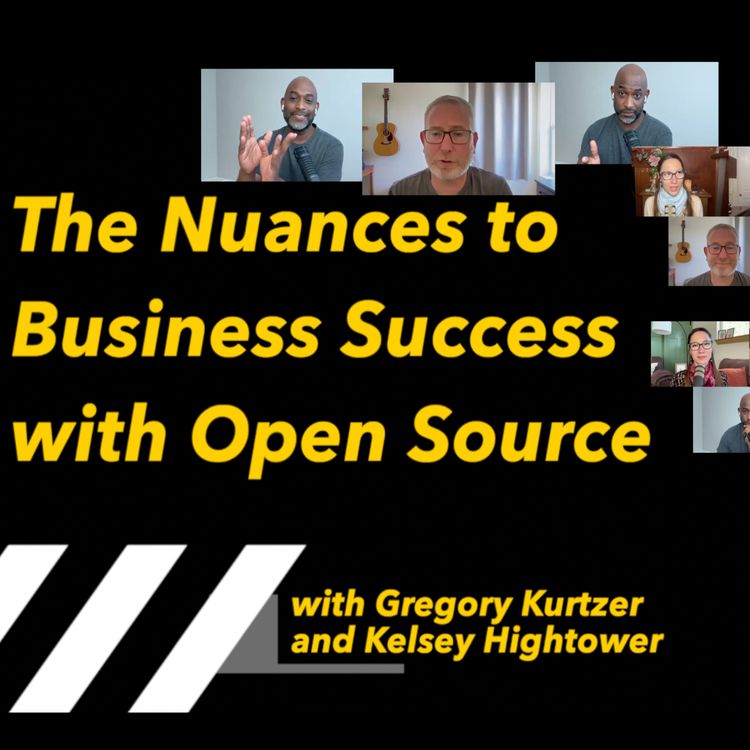
My Open Source Experience Podcast
The Nuances to Business Success with Open Source
Building a business strategy is hard in general, and when open source becomes part of the equation it can get even more challenging.
In the recent past there were multiple examples of companies changing the license on their open source project to something less or not at all open. This is often harmful to the companies themselves and the pattern is always harmful tot he open source ecosystem.
In this episode of the My Open Source Experience podcast Gregory Kurtzer and Kelsey Hightower share their experiences to dig deeper into the challenges and solutions to building a business around open source.
You will learn the following:
- How to evaluate if your company is ready to get involved in an open source project or open up one of their internal ones
- Why it matters who owns an open source project's trademark
- Why is lock out sometimes worse than lock in
- How to identify the business value when relying on open source projects
- How to figure out which open source project is viable to build a business around
- Empty promises don't work long term
More episodes
View all episodes
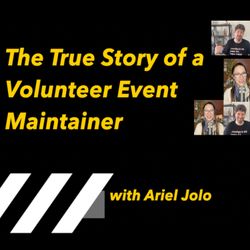
12. The True Story of a Volunteer Event Maintainer
46:20||Season 3, Ep. 12Running events is not easy, even for companies and organizations who this as (part of) their business. If you think that maintaining open source events as a volunteer organizer in your free time is impossible, you're proven wrong!In the My Open Source Experience podcast episode, Ariel Jolo shares his experience how he got from helping his friends install Linux on their PCs and then becoming a sysadmin all the way to being the organizer of Nerdearla. Recent occasions of the event attracted over 10,000 people in person and over 30,000 people online, and yet, Ariel is organizing the series in multile locations aroudn the globe on his free time without any monetary compensation.Learn more about:- Building a community as a kid- Getting from interest in OSS to a paid job- How to make a gathering for sysadmins go viral- The story behind the Nerdearla event- What it takes to organize a wildly successful event series in your free time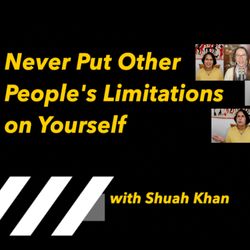
10. Never Put Other People's Limitations on Yourself
48:27||Season 3, Ep. 10We often talk about how tech and the open source ecosystem are both male-dominated environments. The numbers are bad, and while there's a lot that companies and communities can and should do, they can't fix everything.In this episode of the My Open Source Experience podcast, Shuah Khan opens up about her childhood and upbringing to share where she got some of her drive, motivation and spirit to embark on a journey from India to the United States and pursue a career in tech, and later on become a Linux kernel maintainer. Beyond having a successful open source career in open source and Linux, Shuah is also passionate about mentorships and improving inclusivity in open source communities.Learn more about:- Inspiring kids to be curious and pursue their dreams- Preparing for a successful tech career as a woman- Not putting other people's limitations on yourself- Pillars for building inclusive open source communities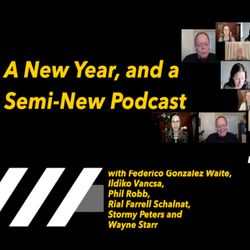
9. A New Year, and a Semi-new MOSE Podcast
46:28||Season 3, Ep. 9The new year brings a semi-new My Open Source Experience Podcast.In this epside of the MOSE podcast, Ildiko kicks off with an announcement about the podcast. She then transitions into topics that outline upcoming episodes in the thrid season, and further highlights for the new year.Learn more about:- Upcoming open source events in 2026- A retrospective on where the MOSE podcast started, and what is still applicable from the goals- Stormy Peters talks about the Mozilla Foundation and Mozilla Corp- Wayne Starr shares s=his experience working on OSS in his free time- Ria Farrell Schalnat talks about the legal community- Federico Gonzalez Waite shares his experience transforming the Mexican government to rely on OSS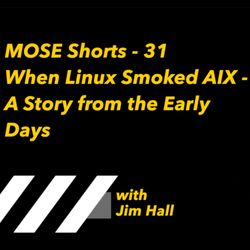
MOSE Shorts - 31: When Linux Smoked AIX - A Story from the Early Days
08:37|In this MOSE Short segment Jim Hall talks about his experience of introducing open source at every company where he worked. He also shares a story about starting to deploy Linux servers at one occasion, which outperformed the AIX systems that the company had at the time. They ended choosing Linux because it was the best technology for their use case on the market, with enterprise support and a very favoarble price tag. It just happened to be open source.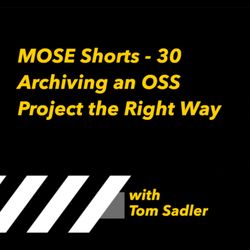
MOSE Shorts 30: Archiving a Project the Right Way
07:13|Technology, just as everything else moves forward, and sometimes that means that a project gets superseeded by something else that is better, more performant and a more promising options long term. When your project reaches this phase, it still matters what process you choose to follow when you archive it, since abandoning it silently from one day to the other is harmful to everyone else who is still relying on it and is under the impression that the project is still maintained by the community.In this segment of the My Open Source Experience podcast Tom Sadler talks about te TAL (TV Application Layer) project, which they have been using on TV devices. While the project is still used within the BBC in some corner cases, it is largely replaced by web technologies by now. When it comes to the open source project, maintainers of the project chose to mark it clearly archived on GitHub and even left an email address for people to reach out in case they have a question or comment about the project. Surprisingly, this provided an opportunity to the ecosystem to still connect about the overall technology and problem space, which turend into a tech meetup series.Learn about the stpes of archiving a project, such as:- Marking it 'Archived' on its hosting platform- Updating the README- Closing issues and bug reports- Closing Pull Requests or Reviews- Leave contact information, if there's still someone who can follow up on questions and commentsAlso keep in mind the CRA, as there are some requirements coming about how to properly archive a project!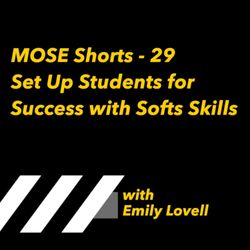
MOSE Shorts - 29: Set Up Students for Success with Softs Skills
08:52|In this MOSE Short segment Emily, Ildiko and Phil talk about the improtance of being able to make an argument to succeed in both open source and corporate environments. The group also discusses how mentorship programs that help students participate in open source projects can be encouraging for them to stay and thrive in the tech industry.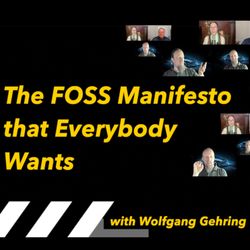
8. The FOSS Manifesto that Everybody Wants
42:12||Season 3, Ep. 8Deciding to go all in on open source is often an enormous milestone in itself, however, it is just a small first step in the overall change process. Many companies have the buy-in on the engineering level, and some have it in the top management as well, but that is not enough!In this episode of the My Open Source Experience podcast, Wolfgang Gehring shares his journey through this transformation within his company, Mercedes-Benz, which has been centered around a FOSS Manifesto that made a huge impact in the industry.Learn more about:- The Mercedes-Benz FOSS Manifesto- The influence the company achieved, internally and industry-wide, by publishing their manifesto: https://opensource.mercedes-benz.com/manifesto/ - Why the company made the manifesto available under the Creative Commons license- Automotive-focused open source groups- Knowledge building and sharing within a large company
7. Let's Talk Business, Standards and Open Source
43:43||Season 3, Ep. 7Both business language and standards can be very strict, especially when we are looking into practices of governments or highly regulated industries like automotive and telecommunications. On the contrary, open source is developed by diverse groups, where standards and regulations don't apply to all use cases, and is often valued for its flexibility. So, how do all these fit together?In this episode of the My Open Source Experience podcast, industry experts explore how to fit open source into very strict processes and standards.- Ashan Senevirathne covers efforts in the telecom segment where standards, technology evolution and open source clash- Austen Bryan share his experience with fitting open source into the acquisition guidelines and processes that the United States government has- Magnus Buhrgard highlights examples of bringing open source standards and patents closer to each other- Philipp Ahmann talks about safety standards in the automotive industry, and highlights where open source is used within cars- Samson Goddy shares tips on how to talk about open source in corporate environments using business language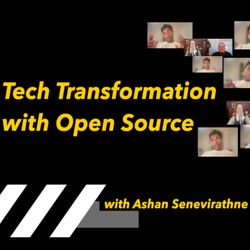
6. Tech Transformation with Open Source
44:14||Season 3, Ep. 6Technology provides a lot of opportunities and companies need to be flexible to grab them, but they aren't always ready. The telecommunications segment is an example where flexibility is not a given, historically.In this episode of the My Open Source Experience podcast, Ashan Senevirathne talks about his experience working for operators in the telecom segment. As operators are transforming their networks it's not enough to just into the software, they also need to evolve company practices and culture. Open source plays a key role in this overall transformation.Learn more about:- The five nines concept, and how that pairs with failing fast- Transforming a telco in to a tech-co- How ot get from strong proprietary culture to open sourcing a project- The role of FOSS guidelines- Open source business values